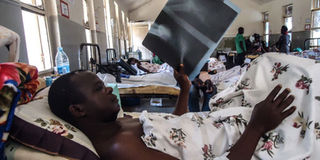Relief as Masaka hospital restores X-ray services

Examined. Mr Yusuf Ddumba, an accident victim, displays his X-ray results at Masaka hospital on Monday. PHOTO by WILSON KUTAMBA
What you need to know:
Reason. The services had been suspended in March over safety concerns.
Masaka hospital has resumed X-ray services after a seven-month suspension by the Uganda Atomic Energy Council (AEC-Uganda).
AEC-Uganda suspended X-ray services at the hospital in March over leakage of radiation, which exposes the personnel operating the X- ray machine to high levels of radiation which can lead to cancer.
AEC-Uganda is a government body mandated to regulate the peaceful application of ionising radiation, protection and safety of radioactive sources.
“The challenges we had with our X-ray machine have since been addressed and people can now access the services as it was before,” Mr Edward Kabuye, the principal hospital administrator, said on Monday.
The absence of X-ray services had forced many patients to seek the services from private health centres in Masaka Town.
Records at the hospital indicate that the facility receives at least five patients on a daily basis. X-ray services at the hospital are free of charge.
Residents welcomed the resumption of X-ray services, with many saying they could not afford the high costs charged at private health facilities.
Mr Samuel Jjuko, a resident of Kyabi Village, Sembabule District, said he struggled to raise Shs40,000 demanded by a private health centre in Masaka Town where he took his brother, who was injured in a boda boda accident.
“He had got a boda boda accident and I had already incurred transport costs, so it was not wise to go back home without knowing the state of his fractured left leg,” he said.
Mr Swaibu Makumbi Sulambaya, the chairperson of Masaka Hospital Patients Association, asked the hospital administration to address allegations of some health workers charging patients for X-ray services.
“We have fought this habit [of charging money from patients] for so long, but it has persisted. We pray that staff at the X-ray department will not ask for money this time,” he said
However, Mr Kabuye said services at the facility were free and warned that health workers who demand money from patients would be prosecuted.
“Except at the private wing , other services at the hospital are free of charge and whoever will be caught demanding money from patients will be arrested and prosecuted,” he said.
Mr Kabuye said the pharmacy at the hospital private wing will continue operating despite a presidential directive banning all private pharmacies within public health facilities.
“The President was referring to purely private pharmacies which we do not have here. Ours [pharmacy ]is attached to the private wing and is part of the hospital,” he said.
In a September 30 letter, President Museveni directed the Ministry of Health to close all privately owned pharmacies in government health centres.
Mr Museveni said he had received information that the pharmacies are owned by health workers and “instead of prescribing the use of government medicine, they prescribe the selling of their own drugs”.
The National Drugs Authority has since issued a statement indicating that it would not renew operational licences or issue out new ones to privately-owned pharmacies or drug shops in public health facilities.
Masaka hospital’s serves about 2,000 patients on average daily.
contact with patients stands at about 2,000.
which was simply a treatment centre for syphilis was elevated to a referral status in 1995 to offer services to the greater southern region districts. These include; Masaka, Rakai, Lyantonde, Lwengo, Sembabule, Bukomansimbi, Kalungu and Kalangala.
The hospital management has, however, been grappling with a number of challenges ranging from lack of space to accommodate the overwhelming numbers of patients, inadequate drugs and irregular power supply.
Being on the busy Mombasa-Kampala, Mbarara-Kigali highway, the hospital is the first point of call for a number of patients including accident victims. The facility’s average daily contact with patients stands at about 2,000.




